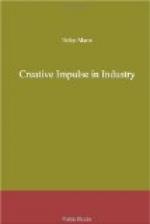It is the present duty of American educators to realize these two points: that industry is the great field for adventure and growth; that as it is used now the opportunities for growth are inhibited in the only field where productive experience can be a common one. Shortly it will be the mission, of educators to show that by opening up the field for creative purpose, fervor for industrial enterprise and good workmanship may be realized; that only as the content of industry in its administration as well as in the technique of its processes is opened up for experiment and first-hand experience, will a universal impulse for work be awakened. It is for educators, together with engineers and architects, to demonstrate to the world that while the idea of service to a political state may have the power to accomplish large results, all productive force is artificially sustained which is not dependent on men’s desire to do creative work. A state as we have seen, may invoke the idea of service. It might represent the productive interests of a community if those interests sprang from the expansive experience of a people in their creative adventures.
In the reconstructive period educators may have their opportunity to extend the concept that the creative process is the educative process, or as Professor Dewey states it, the educative process is the process of growth. The reconstruction period will be a time of formative thought; institutions will be attacked and on the defensive; and out of the great need of the nations there may come change. Educators will find their opportunity as they discover conditions under which the great enterprise of industry may be educational and as they repudiate or oppose institutions which exclude educational factors.
It is for educators to realize first of all that there can be no social progress while there is antagonism between growth in wealth (which is industry) and growth in individuals (which is education); that the fundamental antagonisms which are apparent in the current arrangement are not between industry and education but between education and business. They must know that as business regulates and controls industry for ulterior purposes, that is for other purposes than production of goods, it thwarts the development of individual lives and the evolution of society; that it values a worker not for his potential productivity but for his immediate contribution to the annual stock dividend; or if, as in Germany where his productive potentiality is valued in terms of longer time, it is for the imperial intention of the state and not for the growth of the individual or the progress of civilisation.
CREATIVE IMPULSE IN INDUSTRY
CHAPTER I
PRODUCTION AND CREATIVE EFFORT




